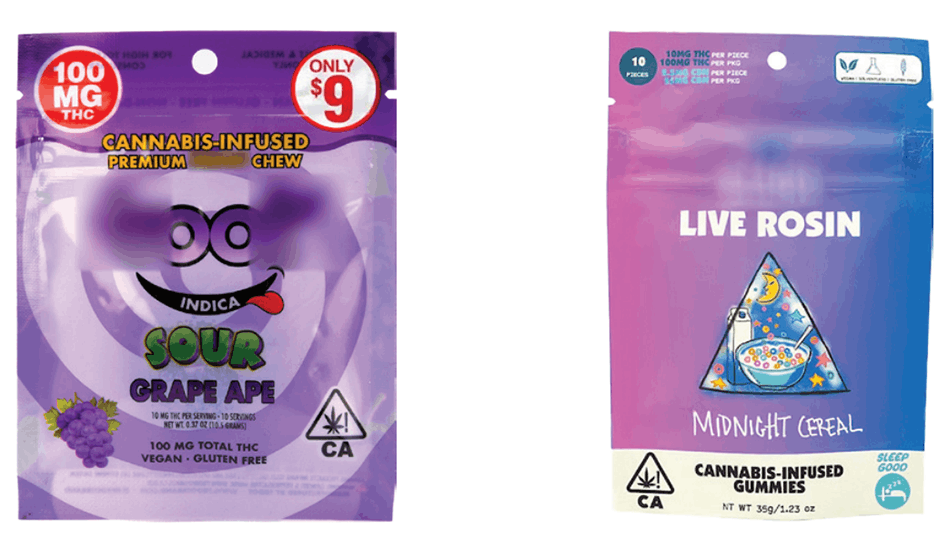
Blog
California Could Tighten Cannabis Regulations, Up Penalties After State Audit

A California state auditor’s report released Aug. 7 could spark cannabis regulatory changes related to product packaging, business inspections, penalties, flavors for inhalants, and even strain names, such as Lemon Cherry Gelato.
The 53-page report from California State Auditor Grant Parks’ office outlines key findings, including packaging and strain names that are attractive to children, and a lack of resources within the state’s Department of Cannabis Control (DCC) to properly identify and track repeat offenders.
Parks’ audit of the DCC specifically focused on the department’s youth advertising and marketing enforcement.
“We found that state law and DCC’s regulations about design elements that are attractive to children are unspecific, leading to subjective and sometimes inconsistent determinations of whether cannabis product packaging is compliant,” Parks wrote in an Aug. 7 letter to Gov. Gavin Newsom and legislative leaders in the California Senate and Assembly.
“Additionally, DCC does not adequately discipline the cannabis businesses that it licenses (licensees) who repeatedly violate regulations regarding attractiveness to children,” he wrote. “DCC’s inspectors do not have consistent documentation practices, and we could not conclude that DCC consistently checks a licensee’s compliance history when evaluating whether that licensee is selling a cannabis product with packaging that is attractive to children.”
Parks recommended that state lawmakers clarify design elements that are prohibited from cannabis packaging, and that the DCC improve its documentation while also specifying penalties to disincentivize repeat offenders.
Furthermore, the state auditor found that the DCC’s regulations do not adequately prohibit flavors in cannabis inhalants, and that the department does not regulate the use of strain names on product packaging that suggest flavors are attractive to children. Parks specifically called out strain names like Cherry Pie, Tropicana Punch and Lemon Cherry Gelato, the latter of which was a top-10 bestseller for California operators in 2024. Some cannabis strain names are likely attractive to children, according to the California State Auditor.auditor.ca.gov
Some cannabis strain names are likely attractive to children, according to the California State Auditor.auditor.ca.gov
Parks recommended that lawmakers specify in state law what flavors are prohibited and that the DCC regulate the use of cannabis strain names on product packaging that suggest flavors attractive to children.
In urging legislative and departmental action, the state auditor called attention to a specific public safety trend that ensued after California voters passed Proposition 64 to legalize adult-use cannabis in the November 2016 election.
In the report, Parks points out that there was a 469% increase in the number of calls to the California Poison Control System related to accidental cannabis ingestion for children 5 years and younger—from 148 calls in 2016 to 842 calls in 2023.
In a July 22 response to the state auditor’s draft report, DCC Director Nicole Elliott said the department remains committed to preventing youth exposure to cannabis. However, she said those numbers don’t tell the whole story.
“Exposure of children to cannabis is a serious and growing issue,” Elliott wrote. “These statistics do not differentiate between instances related to legal and regulated cannabis products and instances with unregulated, illegal products such as hemp-derived THC edibles, homemade cannabis edibles, or other illicit products without formal access restrictions.”
Within a year of California launching licensed adult-use cannabis sales in January 2018, the federal government passed the 2018 Farm Bill, expanding the legalization of hemp from pilot programs to full-scale implementation. As a result of vague language in the federal legislation, intoxicating hemp products—notably consumable products—proliferated nationwide, leaving states like California struggling to regulate the marketplace.
Parks said in the audit that edible THC products, in particular, appeal to youth because of their shape, color and taste, as well as colorful branding and advertising of fruity or candy flavors.
In addition to hemp, California cannabis regulators and enforcement officials have largely been unsuccessful in eradicating the illicit market: According to a March 2025 report commissioned by the DCC, California produced roughly 11.4 million pounds of unregulated cannabis compared to 1.4 million pounds of regulated cannabis in 2024.
If the unregulated cannabis has a similar retail value to the licensed cannabis, then that means California produced roughly $42 billion in cannabis last year, with $4.7 billion purchased legally in the state, roughly $7.8 billion purchased illegally in the state, and another roughly $29 billion shipped out of state.
“DCC cautions against overstating regulated cannabis’s impact on the increase in exposure of children,” Elliott wrote. “While regulated cannabis has become more widely available, publicly available data still shows that only less than half of California has access to regulated cannabis products, while the entire state continues to have access to illicit or unregulated cannabis. These other products are almost certainly significant contributors. Addressing this issue requires a full understanding of all the ways children are exposed to cannabis.”
Elliott also pointed out that children are less likely to access cannabis that’s regulated by child-resistant packaging and point-of-sale age verification than unregulated products.
Nonetheless, Parks took issue with the DCC’s practices, claiming that 14 of 40 cannabis products his office reviewed had images of food or candy on the packaging. This product review included 24 edibles, six beverages, four concentrates, three tinctures, one flower, one pre-roll and one topical.
 Despite DCC’s Regulation Prohibiting Cartoons, Packaging on Some Cannabis Products Presented Cartoon Images of Foodauditor.ca.gov
Despite DCC’s Regulation Prohibiting Cartoons, Packaging on Some Cannabis Products Presented Cartoon Images of Foodauditor.ca.gov
Parks pointed out that Oregon “uses a best practice” by requiring its cannabis commission to review packaging before a cannabis product goes to market, and that Oregon also limits certain strain names. He suggested that the California Legislature consider adopting a similar process, including prohibiting bubble and cartoon-like fonts and bright or neon colors on packaging.
The California auditor also outlined what it called subjected determinations by the department.
“For example, DCC reviewed three similar cannabis crispy rice treat packages and found that only one was attractive to children,” according to the report. “We believe that images of foods like marshmallows, cereals, fruits, and chocolate chips are attractive to children.”
 Images of food or candy children might like, including images of the product itself, according to the California State Auditor.auditor.ca.gov
Images of food or candy children might like, including images of the product itself, according to the California State Auditor.auditor.ca.gov
Parks also determined that the DCC has taken “minimal action” against licensees who use packaging that the auditor’s office believes is attractive to children, and that the department does not adequately track repeat offenders.
“DCC reports that it only has the resources to inspect about half of the state’s licensees per year but would ideally inspect every licensee annually,” according to the report. “DCC neither adequately tracks nor escalates penalties for repeat violators. For example, one licensee violated regulations that prohibit packaging that is attractive to children four times, yet DCC did not increase penalties.”
Regarding resources, the DCC has conducted roughly 3,875 inspections annually since 2022, yet the state has roughly 8,900 licensees, according to the report.
While the DCC indicated that it would work with state lawmakers on any legislation resulting from the auditor’s report, department officials disagreed with Parks’ conclusion that they need to modify their disciplinary actions for repeat offenders, according to the report. Elliott said the DCC follows a structured approach to discipline.
However, DCC staff did share ideas with Parks’ office about possibly implementing packaging regulations to prohibit:
- Images of anthropomorphized fruit, candy, and confections
- All characters, human or otherwise
- Images of animals and humans
- Holographic packaging or stickers
“Addressing ‘attractiveness to children’ can be a complicated issue,” Elliott wrote. “The challenge DCC must overcome in its effort to rein in harmful packaging elements is what is ‘attractive to children’ can be inherently subjective, culturally influenced, and dynamic over time. This effort will always be a work in progress as cultural trends and tastes change. DCC’s current regulations aim to give the department flexibility to modify its determinations as branding and packaging evolve with current trends and associations. The department welcomes input on how best to strengthen this effort.”



